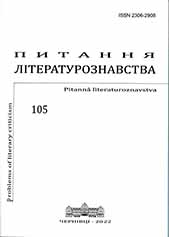„Айріс” (2001) Річарда Ейра: специфіка кінорецепції біографії письменниці
“Iris” (2001) by Richard Eyre: Film Reception Specificity of the Writer’s Biography
Author(s): Aliona Matiychak, Nataliia NikoriakSubject(s): Language and Literature Studies, Film / Cinema / Cinematography, Theory of Literature
Published by: Чернівецький національний університет імені Юрія Федьковича
Keywords: biopic; memoirs; film reception; Iris Murdoch; Richard Eyre; “Iris”;
Summary/Abstract: The article analyses the film reception issues of I. Murdoch’s biography in epistemological and historiographical perspectives. Due to the productive interaction of different types of biographical works, the mechanism of presentation / perception / cognition is mainly realized through references and reflection as an individual ability to supplement the “truth” of factual biographical material with other relations such as “interpretability”, “realizability” that form the so-called cognitive complex related to the perception peculiarities of biopic both as a separate genre and in the context of other biographical genres: memoirs, literary biography, etc. In the global context of biopics about writers, the film “Iris” (2001), directed by Richard Eyre, is perceived quite ambiguously. This receptive „ambiguity” is explained by the fact that R. Eyre deviates to some extent from the established canons of the biopic genre, building his plot on the contrast of two planes of relations between famous intellectuals – Bayley and Murdoch – as young, talented, charismatic, open-minded in her relationships Iris and as an elderly woman suffering from an incurable disease. Since it is almost impossible to cover her life in all its manifestations and activities in one perspective, the director resorts to intermedial dimensions and techniques of presenting biographical material. Relying on the documentary basis and memoirs of Murdoch’s husband John Bayley (“Elegy of Iris” and “Iris and Her Friends”), due to chronotopic shifts, television biography in the biopic, excerpts from Murdoch’s lectures, emphasizing her quotes scattered in the film, R. Eyre frames his model of Murdoch’s biography. This strategy allowed him, albeit fragmentarily, to show one of the world's smartest women in various guises: as a writer, as a philosopher and as an ordinary person, recreating the happiest and the most tragic fragments of her life, especially during the progression of Alzheimer’s disease.
Journal: Питання літературознавства
- Issue Year: 2022
- Issue No: 105
- Page Range: 94-110
- Page Count: 17
- Language: Ukrainian

